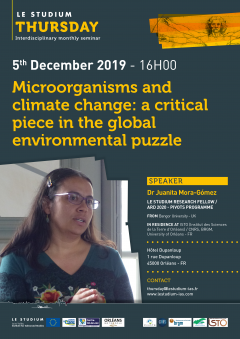Microorganisms and climate change: a critical piece in the global environmental puzzle
Hôtel Dupanloup
1 rue Dupanloup
45000 Orléans
France
Presentation
Microorganisms, including bacteria and fungi, are recognised for the human and animal diseases they cause, but they also play a less known crucial role in countless natural processes, being partially responsible for many of the ecosystem services. They are present practically everywhere and involved in many biogeochemical cycles, from the most abundant elements in the biosphere, such as carbon or nitrogen cycling, to metals.
One of the most central roles that microorganisms play at a global scale is the degradation of organic matter (dead plant and animal tissues) in soil and water. As part of decomposition process, greenhouse gases (GHG), such as carbon dioxide, methane, and nitrous oxide are produced. Globally there are still many gaps in our knowledge of the mechanisms behind microbial carbon cycling and fill them is essential to propose mitigation strategies to urgent environmental problems as the ongoing climate change.
In this talk, I will give a general picture of the role of microorganism in the organic matter processing and carbon cycling in peatlands, by showing some results of my previous and current research. Peatlands are strategic ecosystems in the global carbon cycle as they only cover around 3% of the global land surface and keep 1/3 of the carbon stored in the soil, produce about 25% of the total methane, and export substantial amounts of dissolved carbon to aquatic environments.
Keywords
Microbial ecology, peatlands, carbon cycle, GHG emissions
Speaker
Dr Juanita Mora-Gómez, LE STUDIUM RESEARCH FELLOW / ARD 2020 - PIVOTS Programme
FROM: Bangor University - UK
IN RESIDENCE AT: ISTO (Institut des Sciences de la Terre d'Orléans) / CNRS, BRGM, University of Orléans - FR










